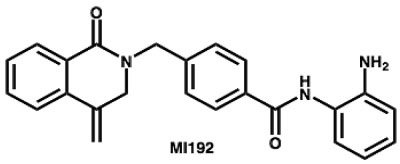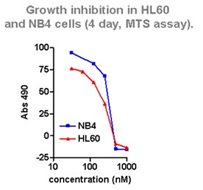Histone deacetylase inhibitors (HDACis) have emerged as efficacious agents in the treatment of cancer. However many HDACis are non-selective and efforts to develop selective HDACis have been increased. Professor Ronald Grigg has developed a unique inhibitor; MI-192 which has a marked selectivity for Class I HDACs.

Structure of MI-192. (Gillespie et al. 2012. Arthritis Rheum. 64(2):418-22.)
HDACs are a class of proteases which have been classified into 4 groups based upon their sequence similarity, intracellular localisation and tissue specific distribution. Class I HDACs encompass HDAC1, 2, 3 and 8. MI-192 has a selectivity for HDAC 2 and 3.
MI-192 has shown potent activity in a wide variety of cancer cell lines including HCC-2998, SF-268 and HL-60. These studies have suggested that MI-192 might have a potential therapeutic use in treating leukaemia.
MI-192 has also been shown as a potential therapy for rheumatoid arthritis. Since HDAC3 has been shown to be involved in the regulation of proinflammatory cytokines and cell cycle inhibitors, MI-192 represents a novel treatment approach. The selectivity of MI-192 may also improve therapeutic margins of safety.

Effects of MI-192 on growth.
Professor Grigg developed MI-192 at the University of Leeds where he is currently an Emeritus Professor in the Chemical Biology and Medicinal Chemistry group. Professor Grigg started his career at Glaxo Laboratories, subsequently he undertook his PhD at Nottingham University and postdoctoral research at Cambridge University with the Nobel Laureate Alexander Todd. Professor Grigg has received numerous international awards including his election as a Fellow to the Royal Society.
View the datasheet for more information and publications.
HAVE YOU REGISTERED?
Join the ever-growing global Ximbio community. Register and receive updates about new reagents, institutes and new features being added to the website.
